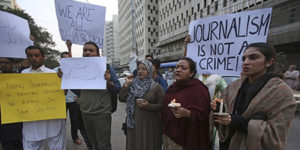CPJ highlights risks for journalists who flee

NEW YORK— The Committee to Protect Journalists on Thursday called on governments to provide safe refuge to journalists at risk through special emergency visas, in a feature and recommendations released ahead of World Refugee Day. Drawing on CPJ’s work over the last two decades helping journalists forced into exile by the threat of arbitrary arrests, physical violence, or other risks in reprisal for their work, the feature highlights case studies from across the globe.
“As complex and protracted conflicts, instability, and authoritarian regimes proliferate around the world, finding safe refuge abroad can often make the difference between life and death for some journalists,” said Gypsy Guillén Kaiser, CPJ’s advocacy and communications director. “It is imperative that governments prioritize emergency visas for swift relocation and safety. Refusing to do so is not only a loss to an individual, but a blow to free expression and access to information globally.”
The report’s recommendations call on national governments, the UN High Commissioner for Refugees, and media outlets, academic institutions, and foundations, to support journalists who are forced to flee, and push for policies that allow for swift relocation in light of the unique circumstances and urgency of these cases.
CPJ has worked on hundreds of cases since the creation of its Journalist Assistance program 20 years ago, and the most common request for support has been for emergency relocation. Whether escaping harsh government crackdowns or waves of anti-press violence, the ability to leave quickly is crucial to survival, leaving little time for a protracted visa process. Journalists told CPJ they are vulnerable to attack, deportation, or forced return while waiting for resettlement processes. However, when they can travel quickly to safe, supportive environments, journalists are far more likely to continue in the profession and eventually return home.
Even far from their homes, CPJ found that the threats to journalists often remain, as observed in Belarus, when authorities diverted a commercial passenger flight in order to arrest exiled journalist Raman Pratasevich. CPJ has documented a myriad of attacks on journalists in exile, including death threats, abductions, assaults, and even murders. Meanwhile, journalists who resettle in countries where they are part of a larger diaspora are often more vulnerable, and research by CPJ and other organizations has also found that authoritarian governments use surveillance technology to spy on journalists living overseas.—
Source: CPJ press release/Photo: AFP
